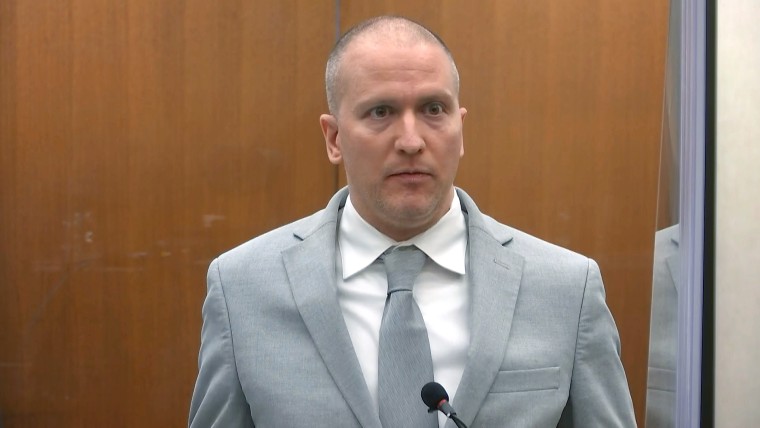Derek Chauvin was sentenced to just more than 20 years in prison Thursday, nearly seven months after he pleaded guilty to federal charges that he violated George Floyd's civil rights when he knelt on Floyd's neck for 9½ minutes as he was detaining him in May 2020.
Before handing down the sentence, U.S. District Judge Paul Magnuson called Chauvin's treatment of Floyd "offensive" and "unconscionable."
"I really don’t know why you did what you did. But to put your knee on another person’s neck until they expire is simply wrong and for that conduct you must be substantially punished," the judge said.
Federal prosecutors had asked Magnuson to sentence Chauvin to 25 years, on the high end of the 20- to 25-year range of the plea agreement, saying Chauvin abused his authority as a police officer and acted callously.
The defense had asked for 20 years, saying Chauvin was remorseful for what he did and that he has accepted responsibility.
Magnuson sentenced Chauvin to 21 years in prison, with credit for the time he has already served, bringing his sentence to 20 years and five months.

Chauvin is already serving a 22½-year sentence after he was found guilty of second- and third-degree murder, as well as second-degree manslaughter, in April 2021 in a state case for the death of Floyd. His federal sentence will be served concurrently.
Chauvin initially pleaded not guilty to the federal charges, but he changed his plea in December. At the time, he also admitted guilt in a separate federal indictment in connection with allegations that he deprived a 14-year-old boy of his civil rights in an encounter in September 2017.
The guilty plea allowed Chauvin to avoid another high-profile trial. The sentence reflects 20 years for the charges related to Floyd and five months for the other case.
Chauvin spoke briefly before he was sentenced, telling the Floyd family that he wished them “all the best in their life,” but did not apologize.
Philonise Floyd, George Floyd’s brother, was among several people to speak in court before the sentencing. He called for Chauvin to receive the maximum sentence, saying he has not had a real night of sleep since his brother was “murdered in broad daylight.”
He said his family has been given “a life sentence” as they will never be able to get his brother back.
John Pope, the boy at the center of the 2017 incident, also spoke during the sentencing and said he feared for his life during his encounter with Chauvin, which “changed my life forever.”
Pope, 19, said he was a “bright kid with dreams,” but those dreams started to slip away after he experienced police brutality at Chauvin's hands.
Chauvin’s mother Carolyn Pawlenty, who called her son a "caring man," asked the judge to send Chauvin to a federal prison near family members.
"I believe it is God's will for all of us to forgive," Pawlenty said. "Everyone in the state of Minnesota needs to heal and remember all lives matter. No matter the color of your skin, every life matters."
Three other former officers at the scene of Floyd’s death — Thomas Lane, J. Alexander Kueng and Tou Thao — were convicted in February on federal charges of depriving Floyd of his civil rights. Kueng and Thao were also convicted of not intervening to stop Chauvin from using excessive force. Their sentencing dates have not been scheduled.
Magnuson said during sentencing Thursday that Chauvin “absolutely destroyed the lives” of those officers.
Kueng and Thao also face a state trial set for October on charges of aiding and abetting second-degree unintentional murder and second-degree manslaughter. Lane pleaded guilty to the state charges of aiding and abetting second-degree manslaughter, avoiding a trial. A charge of aiding and abetting second-degree murder was dismissed as part of the plea deal.
The four officers' encounter with Floyd in May 2020 was captured on video recorded by a bystander, a traffic camera and the officers' bodycams. On the recordings, Thao is seen standing between onlookers as his fellow officers pin Floyd to the pavement. Lane and Kueng are on top of Floyd as Chauvin applies pressure to Floyd’s neck. The officers had been responding to a call from a convenience store about a counterfeit bill.
Floyd’s killing at the hands of police spurred protests against systemic racism and police brutality around the world.
Minneapolis Attorney General Keith Ellison, who led the case resulting in Chauvin's conviction on state charges, called the federal sentencing "another step of accountability on the road to justice."
"Federal prosecutors took this case because it was not a typical crime: it was an intentional deprivation of life and liberty that is criminal under federal law, so it was appropriate and right that they stepped in," Ellison said in a statement. "In obtaining this conviction and sentence, they sent a message to Minnesotans, all Americans, and law-enforcement agencies around the country that crime like this will not be tolerated and that we must do better."
